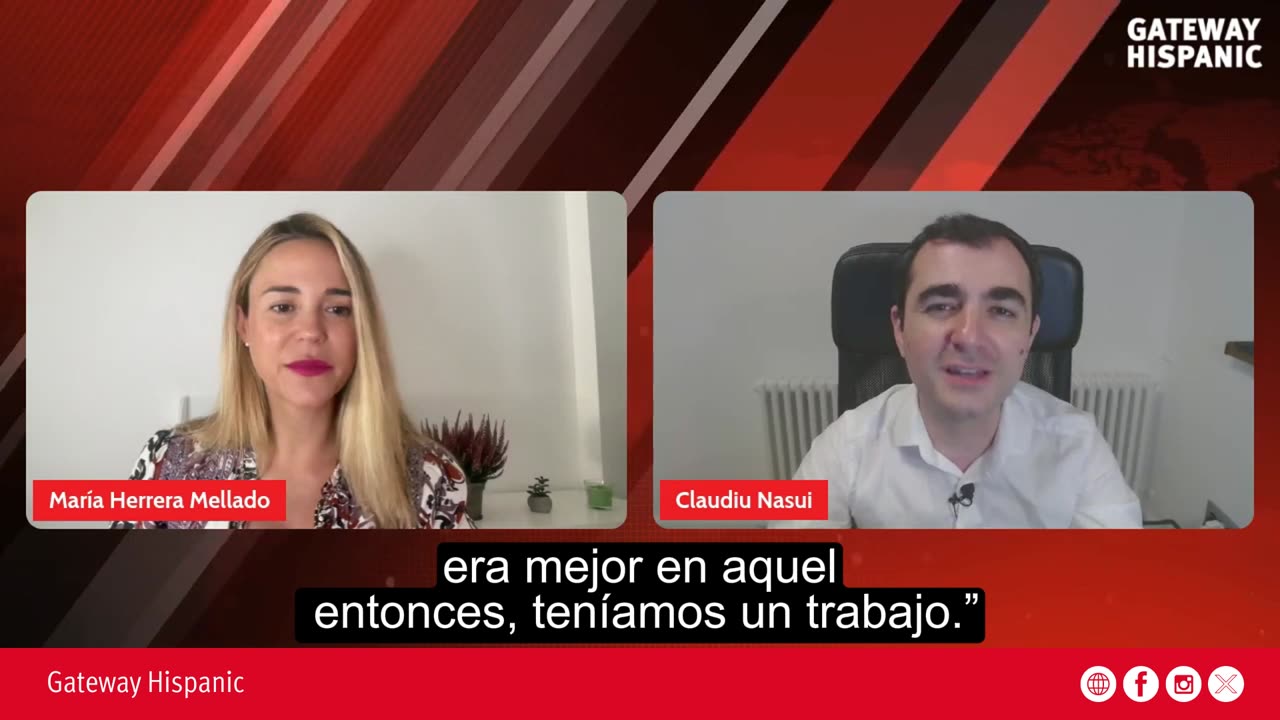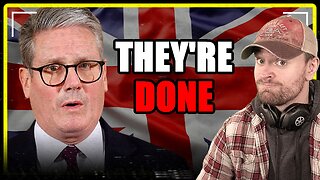Premium Only Content

Claudiu Năsui Analyzes the Challenges of Libertarianism and the Economy in Latin America
In a new episode of Hasta aquí hemos llegado, hosted by attorney Maria Herrera Mellado for Gateway Hispanic, we had the special guest Claudiu Năsui, current Romanian deputy and former Minister of Economy, who shared a deep analysis of the impact of libertarianism on economies like Argentina’s and the social psychology behind political systems.
During the interview, Năsui recalled his country’s historical experience: “Romania had 45 years of communism, the purest form of socialism, where people starved; millions of people died, suffering through a completely destroyed economy. Even 35 years after the revolution, there are people who feel nostalgic and say, ‘Ah, we should have gone back; it was better back then, we had jobs.’”
The deputy highlighted that, although socialism guaranteed employment in state-run factories, it did not generate real value or produce sustainable wealth. “You would have a job because it was a state factory, but in reality, you weren’t producing anything worthwhile,” he explained. This historical analysis served as a foundation for discussing the challenges of classical liberalism and libertarian policies in other contexts.
Economic Freedom and Tangible Results
Năsui reflected on Argentina’s recent experience under Javier Milei and the libertarian policies implemented: “Javier Milei’s classical liberalism has disadvantages, but it also has advantages; it truly reduces poverty, lowers inflation, and allows the economy to grow sustainably and organically, without state intervention.” For him, the key lies in concrete results: fiscal surplus, economic growth, and poverty reduction—indicators that, according to Năsui, confirm that these ideas work when properly applied.
The legislator emphasized that, beyond the personality of leaders, what matters is the effectiveness of the policies: “I’m not a fan of Milei; I admire the guy, but I’m a fan of the ideas he implemented because those are the ones that really work.”
The Challenge of Changing Social Mindsets
However, Năsui acknowledged that adopting libertarian policies faces a significant cultural obstacle: the historical dependence on state assistance. “How do you get society to think differently in free markets, in a free economy? How do you convince them when they are so used to relying on the government?” he questioned.
In his analysis, he noted that even when policies show positive results, social resistance can lead to electoral setbacks: “This is what recent elections in Argentina show: they backtrack because they are afraid, because they lose some privileges, and the government is not able to act quickly enough to fix the market and provide, especially to young people, the opportunities we urgently seek.”
A Global and Comparative Perspective
From his European perspective, Năsui connected Argentina’s experience with Romania’s history, showing how economic and political systems shape long-term social expectations. Nostalgia for regimes that were, in practical terms, destructive reflects the difficulty of changing mindsets and convincing societies of the benefits of a free market.
At the close of the interview, Năsui delivered a clear message for Latin America: “At least we’ve seen what happens when you apply libertarian ideas. The results are tangible: growth, poverty reduction, stability. But the struggle continues because changing the mindset of a society accustomed to state assistance is perhaps the greatest challenge of all.”
In this episode of Hasta aquí hemos llegado, Claudiu Năsui offered a deep, thoughtful, and well-founded analysis of implementing libertarian policies, the impact of socialism on collective memory, and the challenges of building free economies in societies still learning to understand and value true economic freedom.
-
 LIVE
LIVE
SynthTrax & DJ Cheezus Livestreams
14 hours agoFriday Night Synthwave 80s 90s Electronica and more DJ MIX Livestream THE FLOATING WORLD / Variety Music Edition
171 watching -
 LIVE
LIVE
Eternal_Spartan
11 hours ago🟢 Eternal Spartan Plays Destiny 2 | FPS Friday | | USMC Veteran
137 watching -
 2:04:11
2:04:11
MattMorseTV
5 hours ago $1.31 earned🔴The UK just hit ROCK BOTTOM.🔴
46.5K118 -
 LIVE
LIVE
iCheapshot
3 hours ago $0.04 earnedBack From Vacation! | Checking Out Skate Maybe Some Boarderlands 4
232 watching -
 LIVE
LIVE
Jorba4
2 hours ago🔴Live-Jorba4- Borderlands w/ The TRIBE
96 watching -
 54:43
54:43
Glenn Greenwald
6 hours agoGlenn Reacts to Netanyahu's UN Speech; PLUS: Q&A on Trump's Russia/Ukraine Policy, the Tom Homan Investigation, and More | SYSTEM UPDATE #522
72.9K39 -
 43:54
43:54
Donald Trump Jr.
5 hours agoJames and the Giant Breach, Plus Explosive J6 Revelations | TRIGGERED Ep.277
155K176 -

MadHouse_
4 hours agoFRIEND FRIDAY! - Garys Mod ? im pretty sure im gonna lose at this game
23.8K5 -
 2:26:51
2:26:51
blackfox87
4 hours agoBorderlands Grind Continues | PREMIUM CREATOR | #DisabledVeteran
23.3K1 -
 DVR
DVR
Mally_Mouse
5 days agoFriend Friday!! 🎉 - Let's Play! - Gary's Mod!
15.9K